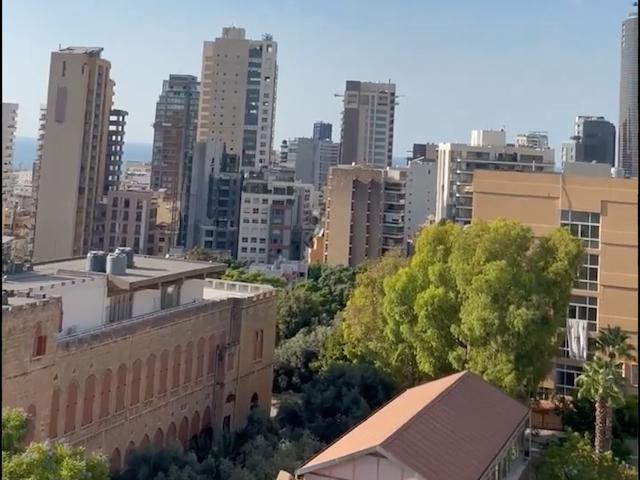Hezbollah has completely evacuated its headquarters in the Beirut suburb of Dahieh, in a dramatic precautionary move against a possible Israeli retaliation. The evacuation was reported by Lebanese media outlet Al Joumhouria on Monday, highlighting the heightened state of alert within the terror group.
The Lebanese news report detailed that Hezbollah has relocated its entire operation—personnel, computers, and crucial equipment—out of Beirut, extending even to its political wing. This decisive action underscores Hezbollah’s acute awareness of the potential for Israeli response, as the group prepares for the worst-case scenario.
This mass exodus follows Hezbollah’s threats to exact revenge for the killing of its top military commander, Fuad Shukr. Shukr was killed on July 30 in an Israeli airstrike targeting Hezbollah’s stronghold in south Beirut. Hezbollah has vowed to avenge Shukr’s death, accusing Israel of responsibility for a July 27 missile attack that tragically killed 12 children in the Golan Heights.
In the last few hours Hezbollah evacuated all its known headquarters in southern Dahieh in Beirut
— Mossad Commentary (@MOSSADil) August 12, 2024
The situation further escalated with the assassination of Hamas leader Ismail Haniyeh in Tehran a day after Shukr’s death. While Israel claimed responsibility for Shukr’s killing, it has remained tight-lipped about any involvement in Haniyeh’s assassination, neither confirming nor denying its hand in the operation.
Nabih Berri, the speaker of Lebanon’s parliament and a staunch Hezbollah ally, declared on Monday that “the response is inevitable,” suggesting that revenge against Israel is not a matter of if, but when. In an interview with Al-Jumhuriya, Berri criticized Israeli Prime Minister Benjamin Netanyahu’s aggressive actions, indicating they were contrary to peace efforts. He warned that a large-scale conflict between Hezbollah and Israel remains a possibility as long as Netanyahu remains in power, though he noted that Iran-backed groups in the region are handling the situation with strategic caution.
Berri also touched on Lebanon’s internal politics, emphasizing that the ongoing conflict with Israel should expedite the election of a new president. Lebanon has been without a functional president for over two years, with parliament failing to elect a new leader in 12 rounds of voting. Berri’s comments reflect the dire need for political stability within Lebanon to fortify its internal front against external threats.
Lebanese media reports that Hezbollah has entirely evacuated its headquarters in the Beirut suburb of Dahieh, the capital of Lebanon, in recent days.
— CYNN (@CYNN_Official) August 12, 2024
Earlier this month, following the assassination of Hezbollah’s top military commander Fuad Shukr in Beirut and Hamas political…
Meanwhile, Iran faces intense diplomatic pressure to refrain from launching a major military response to Haniyeh’s killing. Recent reports from Hebrew media suggest that Israel anticipates a significant Iranian attack within days, contradicting earlier assumptions that Iran would abstain from immediate large-scale retaliation due to international pressure. Instead, Iran was expected to delegate the response to Hezbollah, its proxy in Lebanon.
The conflict intensified on October 7 when Hamas orchestrated a massive cross-border attack from the Gaza Strip, resulting in the deaths of 1,200 people, mostly civilians. Israel’s subsequent military campaign aimed to dismantle Hamas and rescue hundreds of hostages taken to Gaza. Hezbollah joined the fray the following day, launching attacks along Israel’s border with Lebanon in support of Gaza. These near-daily assaults with rockets and drones have forced the evacuation of tens of thousands of Israelis from their homes, escalating fears of a full-scale war.
#Iran-backed #Hezbollah has reportedly evacuated its headquarters in the Beirut suburb of Dahieh. Amid rising tensions with #Israel, Hezbollah is said to be relocating its personnel from Beirut, anticipating further potential strikes. https://t.co/5cyAktQpVU pic.twitter.com/Cj8xuWdO80
— Hindustan Times (@htTweets) August 12, 2024
On Monday, Hezbollah fired 30 rockets at northern Israel in retaliation for an IDF drone strike that killed several of its operatives in Lebanon. Fortunately, there were no injuries from the Hezbollah barrage, but the relentless attacks underscore the volatility of the situation and the ever-present threat of further escalation.
As Hezbollah continues to threaten retaliation for Shukr’s death, the region remains on a knife’s edge, with the potential for conflict looming large over both Lebanon and Israel.


